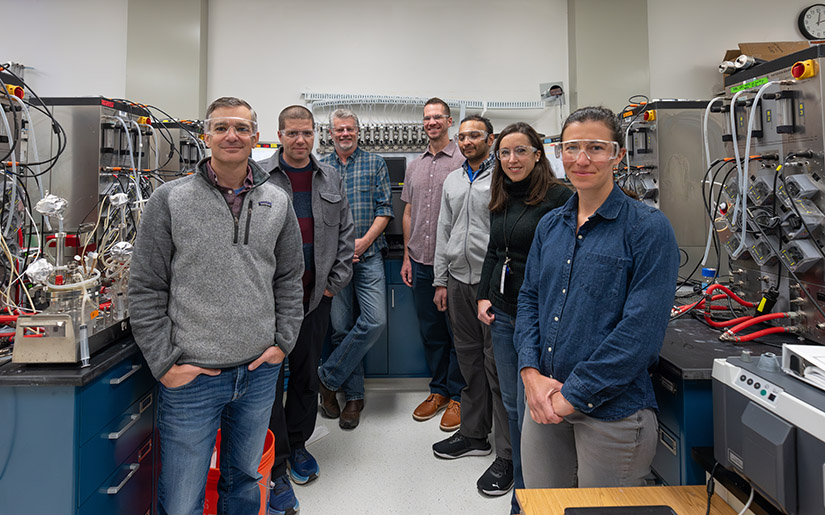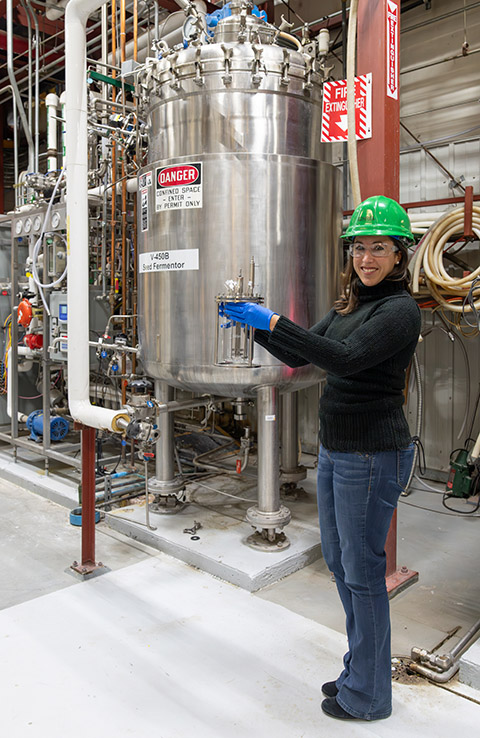NREL and Partners Receive Funding To Decipher Microbial Behavior in Bioreactors at Scale
Study Will Explore Why Promising Biomanufacturing Fermentation Processes That Excel in the Lab May Fail on an Industrial Scale

The NREL research team of (from left) Michael Guarnieri, Jeffrey Linger, Marc Day, Brandon Knott, Hariswaran Sitaraman, Davinia Salvachúa Rodríguez, and Alissa Bleem are studying microbial behavior in bioreactors to predict performance at large scales and identify reasons for potential failure at industrial scale. Photo by Josh Bauer, NREL
Microbial bioconversion of biomass and waste feedstocks to renewable fuels and chemicals in bioreactors is an emerging technology that has seen great success in the laboratory. However, commercial scale-up of this technology has often proven to be a challenge, in large part due to the decreased performance of microbes at scale.
Recognizing that scientific bottlenecks need to be overcome to move a wide range of technologies forward, the U.S. Department of Energy Office of Science announced $73 million in funding for basic research projects to expedite the transition from discovery to commercialization.
A research team led by the National Renewable Energy Laboratory's (NREL’s) Davinia Salvachúa Rodríguez recently received funding for their project, "Real-Time Sensing and Adaptive Computing to Elucidate Microenvironment-Induced Cell Heterogeneities and Accelerate Scalable Bioprocesses."
The project will study and model the behavior of microbes in bioreactors and reasons for potential failures at industrial scale. Scientists supporting this research work for NREL; Pacific Northwest National Laboratory; the University of California, Davis and San Diego; and the University of Puerto Rico, Río Piedras.
"Our team is excited about working with the Office of Science to solve an applied biotechnology challenge using fundamental science. NREL is well positioned to lead this research because of our deep experience with fermentation science at different scales, metabolic engineering, and computation and modeling," Salvachúa Rodríguez said. "In addition, our project will be supported by a scientific advisory board that includes biotech companies and universities. Advisory board members have a keen interest in the outcomes of our research on predicting microbial behavior at scale and will provide guidance during the project."
Making Unpredictable Microbial Behavior Predictable at Industry Scale

Davinia Salvachúa Rodríguez holds a small-scale bioreactor and stands in front of a large-scale bioreactor in the Integrated Biorefinery Research facility pilot plant at NREL. Photo by Josh Bauer, NREL
When moving out of the lab and scaling up bioconversion processes, uncertainties emerge related to microbial performance. Industry-scale microbial cultivations face a series of engineering hurdles driven by a lack of consistency throughout the bioreactor mixture. This results in pH, gas composition, and nutrient gradients that negatively impact microbe behavior.
"The uneven mixing of the components in industrial bioreactors generate microenvironments that impact microbial performance in unpredictable ways," Salvachúa Rodríguez said. "Our goal with this research is to make the unpredictable predictable to increase bioconversion efficiency and reduce overall manufacturing costs."
To identify various microbe behaviors, the project will benefit from NREL's core capabilities in computational and systems biology, metabolic engineering, fermentation science, and artificial intelligence.
With the assembled research team expertise and extensive molecular-level characterization capabilities, the future is bright for addressing the adequacy of microbes for scale-up at the beginning of the innovation cycle and predicting microbial behavior for industrial fermentation processes.
This project was selected under the U.S. Department of Energy National Laboratory Program Announcement for research to Accelerate Innovations in Emerging Technologies.
Learn more about NREL's bioenergy research to support the bioeconomy.
Last Updated Jan. 22, 2026
